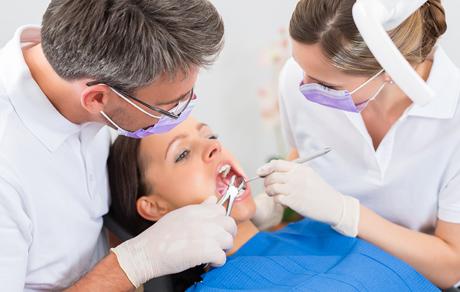Concorde Staff

Have you ever found yourself wondering what the difference is between a dental assistant and a dental hygienist? Dental assistants often work as an immediate aide to a dentist, while dental hygienists often work one-on-one with patients. In addition, between the two areas there are differences in salary and schooling, as well as level of interaction with patients.
Dental Hygienist
A dental hygienist performs tasks that are more advanced and independent; many of these tasks were once performed only by dentists. Their duties may include polishing patients' teeth; removing hard and soft deposits from teeth; and using several tools to remove tartar, plaque and stains.
Overview
- Extra- and intra-oral exams
- Periodontal and dental exams
- Patient history reviews
- Vital sign checks
- Radiographs
- Risk assessments
Dental Hygienist Career Outlook
From 2012 to 2022, dental hygienist employment is expected to grow 33%. Recent and ongoing research links oral health to overall general health, which is a result of the continued demand for preventive dental services often provided by dental hygienists.
According to the Bureau of Labor Statistics, the median annual wage for a dental hygienist salary in May 2012 was $70,210. Salary can vary by region.
Dental hygiene programs are often found at two- and four-year dental hygienist schools and career colleges. All U.S. states require the hygienist to graduate from one of these programs to be eligible to sit licensure examinations.
Dental Assistant
Dental assistants perform both preparatory and breakdown duties in the office. Some of these duties include disinfecting and laying out instruments for a dentist, obtaining patients' dental records, handing instruments to dentists during procedures, and instructing patients on how to care for their teeth after they leave the dentist's office. Other tasks may include administrative office work such as billing patients, making sure payments are received and ordering dental supplies.
Overview
- Instrument sterilization and prep
- Fluoride treatments
- Patient education
- Scheduling
- Patient charts
- Records and supply maintenance
- Accounts payable and fee collections
- Insurance forms
Dental Assistant Career Outlook
According to the Bureau of Labor Statistics, the median dental assistant salary in May 2012 was $34,500. Salary can vary by region.
Employment of dental assistants is projected to grow 25% from 2012 to 2022 due to ongoing and current linking of oral health to the effects of overall general health.
Some states require dental assistants to have additional licensure for operating X-ray machines. Career colleges and dental assistant schools often offer this type of certification that can be acquired within one year.*
Dental assisting and dental hygiene are challenging and rewarding career paths intersecting an interest in the administrative and technical aspects of a dental setting with a passion for serving others comprehensively in their dental health. To learn more, please request information about dental programs near you.
Interested In How To Become a Dental Hygienist?
Click here to explore a Dental Hygiene Associate Degree.
Take The Next Step Towards a Brighter Future
We have a Concorde representative ready to talk about what matters most to you. Get answers about start dates, curriculum, financial aid, scholarships and more!




